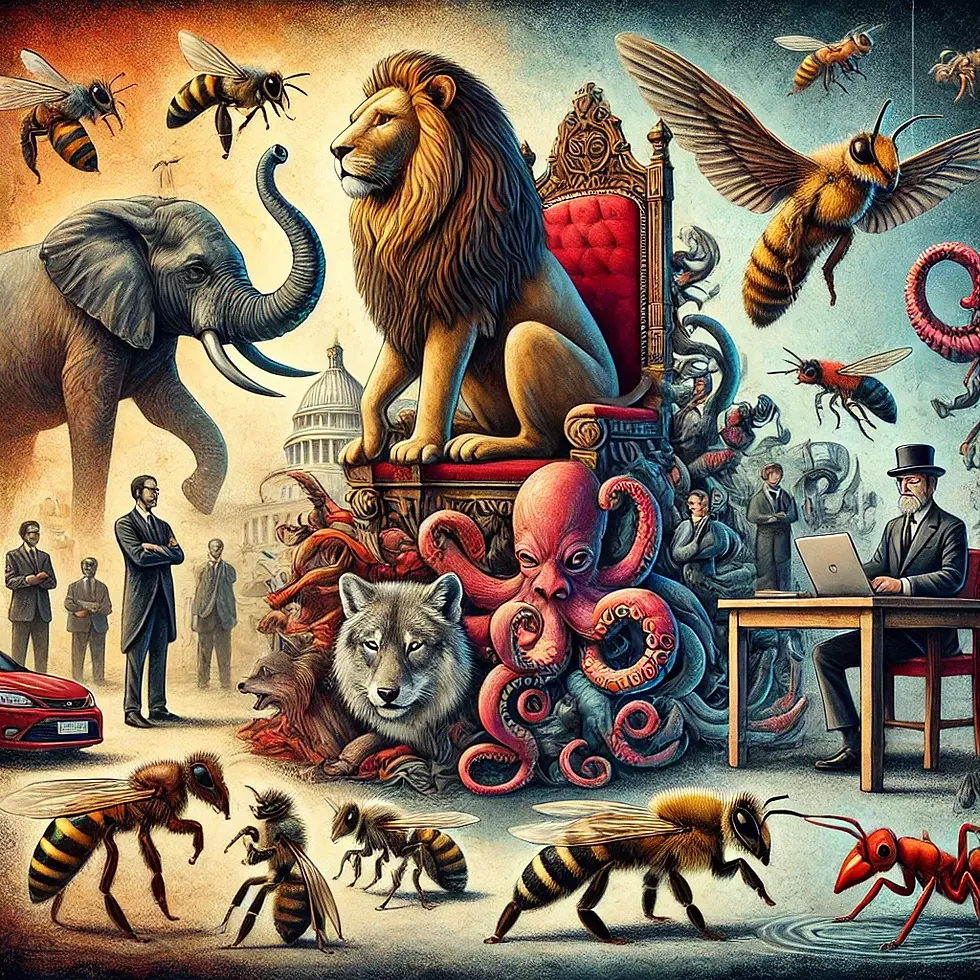
Wild Politics: How Animals Master the Art of Governance (Without the Drama)
- A HumanKind

- Mar 5
- 3 min read
In the animal kingdom, politics is about survival. In the human world, it’s about re-election.
If you think politics is a purely human invention, think again. The animal kingdom has been running its own political systems long before we even figured out how to argue on television. Unlike humans, animals don’t need speeches, elections, or Twitter scandals—yet their societies are built on power struggles, social contracts, and diplomatic maneuvering. Let’s take a look at some of nature’s most prominent political archetypes and their animal counterparts.
1. The Autocrat – The Lion
The lion is the quintessential strongman ruler. As the head of a pride, the dominant male enjoys exclusive mating rights, food priority, and an army of lionesses managing everything else. His reign is absolute—until a younger, stronger rival stages a coup. There are no peaceful transitions of power in lion politics; you either rule or you’re exiled (or worse).
2. The Socialist – The Ant
If Karl Marx had studied ants, he might have written The Antifesto. Ant colonies operate under a strict communal system where every individual has a role: workers, soldiers, and the ever-important queen. There’s no individual wealth, no private property—just an efficient, collective workforce that sacrifices everything for the greater good. The only problem? If you’re not useful to the colony, you’re disposable.
3. The Bureaucrat – The Bee
Honeybees are the perfect example of a bureaucratic society. Every bee has a specific role, and there are complex rules governing their interactions. Even the queen, despite her title, is more of a symbolic leader—she lays eggs, but the hive is actually controlled by a network of workers who dictate everything from food supply to hive maintenance. It’s an efficient, highly structured system… until a power struggle emerges, and the queen gets overthrown in a bloody civil war.
4. The Libertarian – The Octopus
The octopus is the ultimate individualist. Unlike the hive-minded ants or bees, octopuses live alone, solve their own problems, and avoid unnecessary social interactions. They’re highly intelligent, independent thinkers who refuse to conform to a centralized authority. In short, an octopus would rather eat its own tentacle than be part of a government.
5. The Oligarch – The Wolf Pack Alpha
In a wolf pack, power is concentrated in the hands (or rather, paws) of a few dominant individuals. The alpha and beta wolves control access to resources and discipline the lower ranks. The key to success in wolf politics? Strategic alliances. The best way to rise through the ranks isn’t brute force alone—it’s about knowing who to challenge and when to show submission.
6. The Populist – The Meerkat
Meerkats are the charming, ever-vigilant political figures of the animal kingdom. They rely on collective decision-making, but leadership often shifts depending on who’s the loudest (or most paranoid) in the moment. If a meerkat leader senses a threat—real or imagined—they’ll rally the group into a frenzy, proving that fear-based politics is as old as time.
7. The Anarchist – The Bonobo
While chimpanzees solve conflicts through aggression and dominance, their close relatives, bonobos, take a radically different approach: they simply refuse to play the power game. Bonobo societies are peaceful, egalitarian, and solve disputes through… let’s say, “alternative methods” of diplomacy. If the world were run by bonobos, there would be no wars—just a lot of very open-minded negotiations.
8. The Wise Statesman – The Elephant
If there’s one species that embodies wisdom, stability, and long-term governance, it’s the elephant. Elephant herds are matriarchal, led by experienced females who remember where to find food, water, and safety. Decisions are made based on collective knowledge, and disputes are resolved through patience rather than brute force. Unlike many other animals, elephants don’t just think about immediate survival; they plan for future generations. If humans had elephant-style leadership, we might actually solve problems instead of just arguing about them.
Nature Had Politics First
While humans like to believe we invented politics, the reality is that we simply gave names to behaviors that have existed in nature for millions of years. Whether it’s the authoritarian rule of lions, the bureaucratic efficiency of bees, or the independent spirit of octopuses, the political structures we see today are just echoes of instincts that have been around far longer than democracy.
The difference? Animals don’t waste time on campaign ads or empty promises. Their politics may be ruthless, but at least they’re honest.



Comments